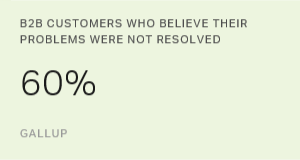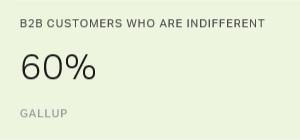Story Highlights
- B2Bs need to make meaningful changes in customers' organizations
- An advice-based approach to customer relationships makes an impact
- The more customers thrive, the stronger the partnership becomes
Only 29% of business-to-business customers are engaged. This lack of engagement poses a significant challenge to companies that want to get more business from those customers -- and retain the business they already have with them.
How can B2B companies increase engagement levels, especially with 60% of customers reporting they're indifferent and 11% actively disengaged?
They can do this in several ways. Some approaches relate to the features of the product or service (for example, being treated as a valued customer) while others relate to customers believing a company is easy to do business with. However, Gallup's research shows that the best approaches are those that drive engagement by generating customer impact.
Gallup defines customer impact as providing a meaningful change in a customer's organization or business model that significantly improves the organization's bottom line. Impact is a game changer: It confirms an organization's value and shows customers that they are more successful doing business with their current vendor than they would be with a competitor. Impact is the single greatest driver in generating growth for B2B companies.

Accelerating Growth
Companies that understand how their products and services help their customers succeed gain two important competitive advantages: customer engagement and customer impact. Gallup research shows that when companies engage their customers and generate impact for them, those companies achieve higher levels of performance than companies that only engage customers.
In the following examples, Gallup analyzed two lines of business for a client company and discovered that the combination of engagement and impact had a multiplying effect on business growth. Customers who were fully engaged and who felt that their vendor was making a significant impact on their business gave the company a larger share of wallet and higher earnings than customers in all other groups. For Business Line A, Gallup found that customers who were fully engaged and who saw impact contributed to 31% higher share and 20% higher earnings than customers who were only fully engaged. For Business Line B, customers who were fully engaged and who saw impact contributed to 9% higher share and 26% higher earnings than customers who were only fully engaged.
| Business Line A | Business Line B | ||||||||||||||||||||||||||||||||||||||||||||||||||||||||||||||||||||||||||||||||||||||||||||||||||
|---|---|---|---|---|---|---|---|---|---|---|---|---|---|---|---|---|---|---|---|---|---|---|---|---|---|---|---|---|---|---|---|---|---|---|---|---|---|---|---|---|---|---|---|---|---|---|---|---|---|---|---|---|---|---|---|---|---|---|---|---|---|---|---|---|---|---|---|---|---|---|---|---|---|---|---|---|---|---|---|---|---|---|---|---|---|---|---|---|---|---|---|---|---|---|---|---|---|---|---|
| +31% Customer Share | +9% Customer Share | ||||||||||||||||||||||||||||||||||||||||||||||||||||||||||||||||||||||||||||||||||||||||||||||||||
| +20% Earnings | +26% Earnings | ||||||||||||||||||||||||||||||||||||||||||||||||||||||||||||||||||||||||||||||||||||||||||||||||||
| Gallup | |||||||||||||||||||||||||||||||||||||||||||||||||||||||||||||||||||||||||||||||||||||||||||||||||||
Moving From Commodity to Collaboration
Companies generate impact by developing an intimate, extensive knowledge of their customer's business and proactively bringing fresh ideas that enhance the customer's business and bottom line. This approach deepens the customer relationship and shifts the focus from commodity to collaboration. It is often based on information that competitors do not have, making it difficult for them to duplicate -- and easily offsetting any reduction in price.
An advice-based approach to customer relationships requires a high level of expertise and in-depth knowledge of the customer and its marketplace. To obtain this level of trust, Gallup's extensive research across industries has found that companies must:
-
know the customer's business
-
bring the customer new ideas
-
make these ideas work for the customer by tailoring them to the customer's marketplace and workplace
Measuring Customer Impact
Gallup measures customer impact by asking customers to rate, on a five-point scale, their level of agreement with a single statement: "Company has made a significant impact on the success of my business." To further identify actions that support positive impact, Gallup conducts qualitative interviews with key stakeholders. In many cases, impact comes from providing specific recommendations or other valuable products or services that enhance the customer's standing and potential in the marketplace while also strengthening business outcomes, including:
-
sharing the company's knowledge about crucial production or supply chain issues with its customer
-
using the company's broader relationships and introducing the customer to other vendors, distributors or retailers that can help with some facet of the customer's business
-
offering more comprehensive, valuable products or services to customers
-
helping customers use the company's products or services more effectively
-
identifying unseen product or service opportunities for customers
-
enhancing customers' standing in the marketplace and thus their potential for future business growth
-
having some broader effect on customers' cost structure, perhaps through more effective supply chain management, inventory control or process improvement
Connecting Customer Engagement and Impact
Customer engagement is fundamental to customer impact because it establishes an element of partnership, which requires a genuine connection between a company and its customers. Even a company with a highly commoditized product has an opportunity to establish an advantage over its competitors by improving customer engagement and creating customer impact. The more a company can help its customers thrive, the stronger the partnership becomes.
Working to create customer impact does not negate the value of the more functional drivers of engagement, such as quality, utility, knowledge and responsiveness. For a company to ensure business growth for a customer, it needs to establish high levels of customer engagement through these more functional drivers. The customer must also have confidence that its partnership with the company has produced or will produce tangible changes in its business performance.



